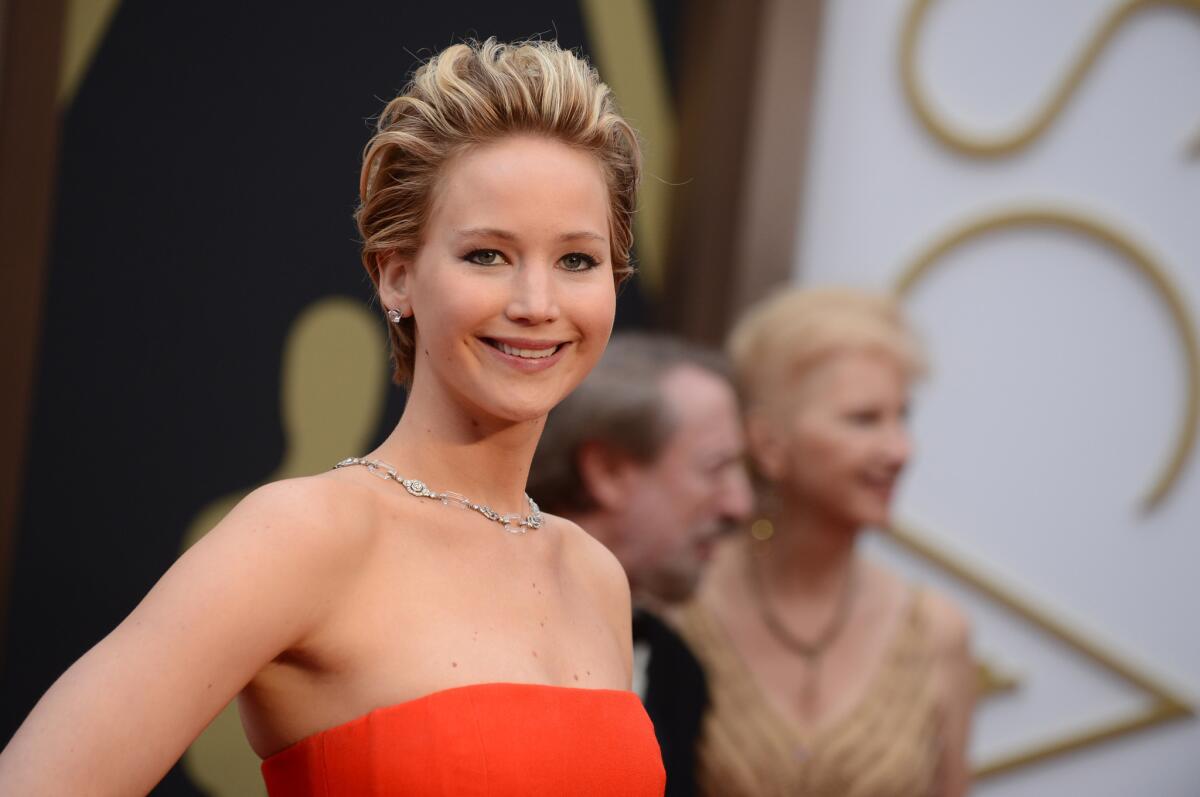Column: Our bodies, our selfies: Is Jennifer Lawrence to blame because she took the photos?

Amid roiling political unrest overseas, the American pop culture scene is facing its own crisis this week. Last weekend, hackers uploaded hundreds of nude photos of female celebrities onto the Internet, many of them selfies and all of them stolen from private data storage accounts. Though it’s not entirely clear how the security breach happened, it appears that the hackers were able to access photos stored on the women’s cellphones, many of the images long ago deleted but hovering somewhere in that amorphous cloud.
The name most associated with the story so far is 24-year-old Oscar-winner Jennifer Lawrence — hackers claim to have some 60 explicit photos of her — but dozens of other actresses, including Kate Upton and Kirsten Dunst, are in the mix. The hackers also claim to have 100 more celebrities waiting naked in the wings, from Kim Kardashian to U.S. women’s soccer team goalkeeper and two-time Olympic gold medal winner Hope Solo.
The whole icky pileup has generated some sympathy. In the spirit of solidarity, an Internet meme has emerged in which people expose what their cellphone camera rolls would have revealed had they been hacked (photos of food and endless shots of pets topped the list). Others sniff that the celebs could have avoided this mess if they hadn’t taken these photos in the first place.
That point is both totally obvious and totally irrelevant. The photos were private property. And though people of a certain age might be perplexed by the nude selfie phenomenon, it turns out to be fairly common. Pew Research tells us that 9% of people say they have sent nude self-portraits and 20% say they’ve received them (which would suggest that the same few people tend to send them to a wide audience). And although it may be a bit surprising that so many celebrities would have this particular habit, it’s worth noting that just about everyone the hackers targeted is a young, millennial type for whom the iPhone camera often doubles as a mirror. Whereas previous generations took their clothes off and struck poses in their bedroom mirrors, today you capture yourself on your iPhone and then play around with the filter settings.
Then there’s the “Hey, these are celebrities, they should just deal with it” argument. This is nothing new. In 2012, when Christopher Chaney was sentenced to 10 years in prison for breaking into the online accounts of Scarlett Johansson and a handful of other famous and non-famous women and posting their nude photos on the Internet, the judge noted that the feeling of violation might be worse for the victims who weren’t celebrities. This despite a videotaped testimony from Johansson, who said through tears that she was “truly humiliated and embarrassed.”
On the surface, the judge’s logic makes a kind of sense. Celebrities, walking the red carpet or walking down the street, are accustomed to exposure. Implicit in the contract they make with the public is that in exchange for being known and adored by millions of people they’re going to tolerate a certain amount of potentially uncomfortable exposure.
But that contract dates to a time when photos, no matter how personal, were never entirely private — at least not as private as ogling yourself in the mirror. There was always at least one other person involved — a photographer, a developer at the lab, the clerk at the drugstore who handed you the prints in an envelope. That, of course, had — and still has — its own perils. Embarrassing or explicit “professional” photos turn up all the time, and aspiring models and actresses continue to be coerced by photographers into posing for images that might come back to haunt them.
Still, in the pre-selfie age, the boundary between merely looking at your reflection and actually capturing that reflection for all eternity was much more clearly established. It may be naive to think that your cellphone is a private lock box, but that doesn’t change the fact that taking selfies starts as a fundamentally private act — even for public figures. Stealing these pictures isn’t just an invasion of privacy; it’s a way of turning victims into unwitting self-pornographers. And that’s a violation no matter how much time you spend on the red carpet.
Twitter: @meghan_daum
More to Read
A cure for the common opinion
Get thought-provoking perspectives with our weekly newsletter.
You may occasionally receive promotional content from the Los Angeles Times.







